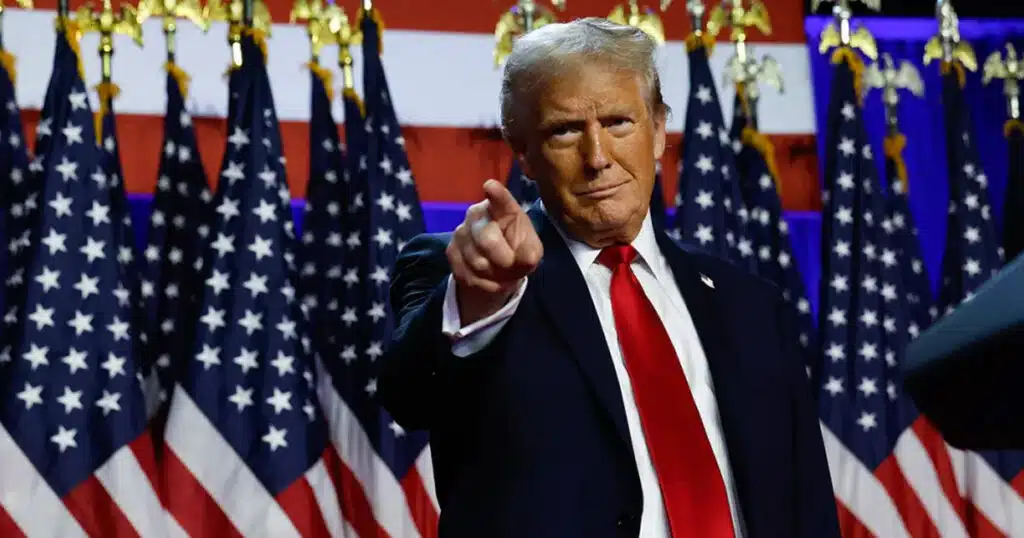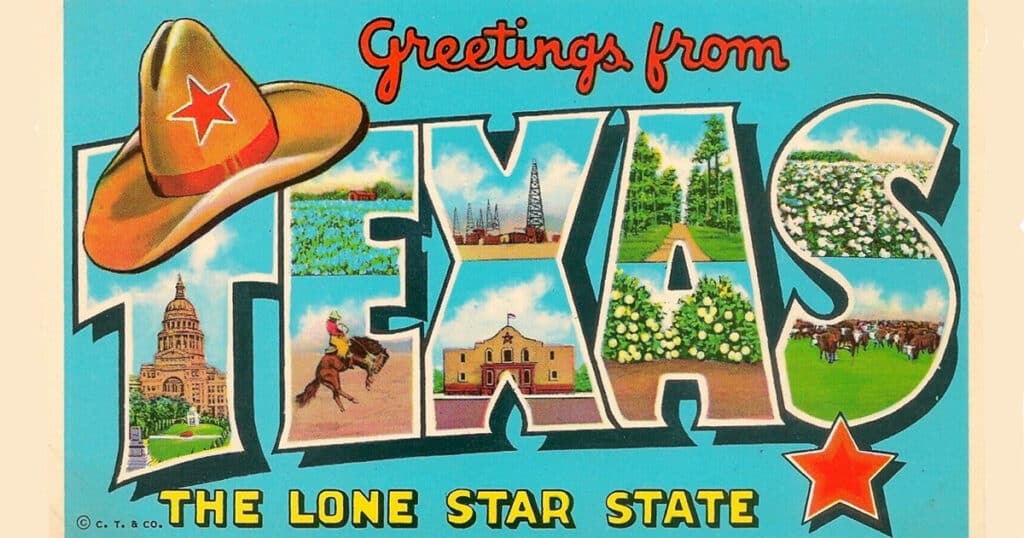
Trump Win Signals Historic Realignment
WEST PALM BEACH, Florida – Donald John Trump, the 45th U.S. president, will soon become the 47th president, after he was projected to win not just the 270 electoral college votes needed to return to the White House but also the national popular vote. His humiliation of the political elite is now complete.
The conservative Fox News channel was first to call the race for Trump while the Associated Press and the legacy television networks held off early Wednesday morning. After Pennsylvania turned red, however, even liberal MSNBC News conceded that the Republican’s lead over Vice President Kamala Harris had become mathematically insurmountable. The AP finally called the race at 5:45 a.m.
Trump is on track to become the first Republican to win a majority of the vote since George W. Bush in 2004, and he will become the first president to serve two nonconsecutive terms since Grover Cleveland in 1892. His triumph represents a wholesale repudiation of the establishment. Big business, Hollywood, the media, and both major political parties treated him as an unwelcome interloper. He delivered his rebuttal on Election Day.
A celebrity known for his starring role on a reality television show, a career in New York real estate, and a knack for showing up in the tabloids, Trump wasn’t even a “citizen politician” when he arrived on the political scene in 2015. He wasn’t a politician at all and had never run for office or been involved in party politics. Dismissed by the commentariat as unserious, he defeated Hillary Clinton in 2016, and was impeached (but not convicted) for his troubles. Four years later, he was again declared politically unviable after he refused to accept the results of his loss to Joe Biden and his supporters stormed the U.S. Capitol. Senate Republican Leader Mitch McConnell condemned him as “practically and morally responsible” for the Jan. 6 riot, but efforts by an increasingly obsolete cohort of GOP were singularly unsuccessful in sidelining the man.
Trump declared his candidacy immediately after the 2022 midterms, marched almost effortlessly through a crowded field of primary challengers, and secured a third consecutive presidential nomination. He did not regain his grasp on the GOP so much as he tightened his grip on that party.
“I think that we just witnessed the greatest political comeback in the history of the United States of America,” Trump running mate J.D. Vance said after Tuesday’s election returns rolled in. There was no exaggeration in his words.
The first time Trump won the White House, he did so as the leader of a white working-class coalition, promising those he would call in his inaugural address “the forgotten men and women” to reverse the “American carnage” brought on by deindustrialization, globalization, and unchecked immigration. The former, and now future, president did not moderate. Opponents condemned his calls for mass deportations as “racist” and his vow to root out the ill-defined “enemy within” as “fascist.”
Those denunciations ultimately had little effect. Not only did Trump maintain his support with the white working class, but he also made significant gains with both Hispanic and black voters according to early exit polls. A multi-class, multi-ethnic coalition returned him to power. One demographic at the center of that electorate: young men.
Tuesday’s results amount to a repudiation, not only of Kamala Harris and Joe Biden, but also the old breed of Republicans who made common cause with corporations and harbored a neoconservative foreign policy. The most visible among them, former Wyoming Rep. Liz Cheney, threw her support behind the Democrat. Trump’s second victory heralds a shifting political landscape that will continue sorting itself out during the presidential transition and in the four-year term to follow.
Reflecting on the breadth of his support, Trump told a crowded victory party that his winning coalition was drawn “from all quarters – union, non-union, African American, Hispanic American, Asian American, Arab American.” Surrounded by his family and campaign staff on stage, he added, “We had everybody, and it was beautiful.”
“It was,” Trump added, “a historic realignment.”
The Harris campaign had already headed to bed at that point. “Let’s finish up what we have in front of us tonight, get some sleep,” campaign manager Jen O’Malley Dillon wrote to her team in an email obtained by RealClearPolitics, “and get ready to close out strong tomorrow.”
The vice president had yet to concede by mid-morning Wednesday. Famous for chiding Republican men when they talked over her – “I’m speaking” – Harris sent her campaign chairman, Cedric Richmond, on stage to tell her supporters at Howard University late Tuesday that they would not hear from her. Many left in tears. Trump World was just beginning to party.
A crowd noticeably younger than the ones Trump attracted in his two previous elections had packed into the Palm Beach Convention Center hours earlier. As their champion monitored data from nearby Mar-a-Lago, they pulled up to any of the six cash bars in the main hall. The most popular beer for the thirsty America First voter: Modelo, a lager from Mexico.
The MAGA faithful were prepared for a long night. News networks warned that the results might not be known on Election Day or even the morning after, a message amplified by Democrats. And there was good reason to believe the race might come down to the wire: Trump and Harris were locked in a dead heat for much of the contest as a divided nation evaluated its options. But just as he used social media to sidestep gatekeepers eight years ago, Trump targeted new, younger voters, with a new medium: the Bro Podcast.
He talked about everything from aliens to artificial intelligence with Joe Rogan, host of “The Joe Rogan Experience.” He chopped it up on the Barstool Sports podcast “Bussin’ With the Boys,” hosted by former NFL football players Will Compton and Taylor Lewan. He asked Theo Von if he still uses cocaine (the comedian told the teetotaling president that the white powder “will turn you into a damn owl, homie”). The conversations did not resemble anything like Frost v. Nixon. Podcasts are certainly much cheaper and less serious. They were instrumental, all the same, in turning out young men who are famously low-propensity voters.
Harris sought to make the race a referendum on Trump. She described him as a threat to democracy generally and an opponent of abortion rights specifically. For his part, he called illegal immigration “the biggest issue” and an inflation-addled economy “the second.” A senior Trump advisor told RCP it was “more like ‘Issue 1A and 1B,’ but immigration is one of them.” Either way, the economic frustrations and security fears were enough to deliver Trump a majority despite the criminal indictments and felony convictions that Democrats had hoped would throttle his candidacy.
Those legal challenges made Trump the symbol of conservative martyrdom. It became visceral at the fairground in Butler, Pennsylvania, this summer when an assassin’s bullet clipped his ear. The photo of the bloody Republican pumping his fist in defiance instantly became an image for the ages.
“This is what happens when the machine comes after you,” bellowed Ultimate Fight Championship president Dana White from the main stage here Tuesday night. “He keeps going forward. He doesn’t quit. He’s the most resilient, hardworking man that I’ve ever met in my life.” Referring to Trump’s victory in the face of the challenges, White said, “This is karma.”
Whatever cosmic forces were at play, victory was not guaranteed. While Trump seemed poised to handle Biden, Harris promised to be a tougher challenge after she delivered a shot of adrenaline straight into progressive hearts. She brought in more fundraising dollars, campaigned alongside celebrities like Oprah Winfrey and Beyoncé Knowles, and turned the race into the definition of a dead heat. Doubt crept into Republican hearts in the final days, especially after The Atlantic magazine reported that morale inside the Republican campaign was cratering. A senior Trump aide texted RCP to say the opposite: “Morale is decidedly very high at this current moment.”
According to longtime Trump confidant Roger Stone, Democrats have only themselves to blame for what happened in this election.
“If you want to make somebody iconic, try to throw them in jail, try to bankrupt them,” said the infamous political operative. “If you want to make somebody iconic, cook up a fake hoax to justify their removal from the presidency,” he added in reference to once-en-vogue allegations that Trump was a Russian asset. “And if you really want to make somebody iconic, try to kill them.”
Stone was not alone in viewing the political attacks – and the attempts on Trump’s life, which Democrats condemned – in the same category: “All those things failed,” he said. “They just made him bigger and more powerful.”
Trump has now dispensed with three Democratic Party opponents – Clinton in 2016 and both Biden and Harris in 2024. Each opponent had the money advantage and what was billed as a much more sophisticated political apparatus. He was able to do this, some Republicans like to say, because he was on a mission from the Almighty. But despite the personal invectives against enemies and frequent calls for retribution that defined his campaign, in his victory speech the president-elect made little mention of his opponent. He was philosophical the morning of his win.
“Many people have told me God spared my life for a reason,” Trump said, “and that reason was to save our country, and to restore America to greatness, and now we are going to fulfill that mission together.”
Congressional majorities are a handy thing to have in that kind of endeavor.
The GOP picked up three Senate seats to secure the upper chamber, while control of the House of Representatives was still too close to call but within reach. The highest-ranking Republican currently in office, House Speaker Mike Johnson, joined Trump on stage. Perhaps signaling that he didn’t have patience for more intramural infighting, he thanked Johnson by name and told the crowd, “I think he’s doing a terrific job.” More work will follow.
Trump has already remade the Republican Party in his own image, greatly diminishing the interventionist and libertarian wings of the GOP in the process. He now promises sweeping tariffs, a strategic retreat from global conflicts such as the land war in Ukraine, and an incessant focus on domestic challenges – the southern border chief among them. “America has given us an unprecedented and powerful mandate,” he insisted. The country only needs to follow his prescription to achieve “a golden age.”
Running against him in a third election, Democrats felt they finally knew what to make of Trump. Clinton made light of his many flaws the first time. Biden defeated him during the second election by painting him as a threat to democracy. For her part, Harris attempted to split the difference.
“In many ways, Donald Trump is an unserious man,” she told her fellow Democrats at their Chicago convention to hearty laughter. “But the consequences of putting Donald Trump back in the White House are extremely serious,” added the vice president – who is slated to soon preside over the certification of his election.
Some of the Republicans who came out to cheer Trump early Wednesday morning saw things similarly, especially the younger ones. They laughed at his unserious moments and listened earnestly to his serious warnings. One example was Caden Caouette, a Florida State University freshman who repurposed a Trump-Pence shirt by covering the name of the former vice president with a piece of masking tape with Vance written in Sharpie letters.
“These last couple of years really speak to it,” he said. “The economy has been bad, and then everybody crossing the border. A lot of work needs to get done, and Trump’s the man to do it.”
A first-time voter, Caouette stood outside the convention center just hours before his morning classes for a chance to cheer on the champion who had once again upended American politics. The podcasts, particularly the one with Rogan last month, he said, served as “a reminder” to vote because it was “not just something I could skip.”
A now certain return to the Oval Office, even for a larger-than-life figure like Trump, once seemed a stretch. In the end, it wasn’t.
This article was originally published by RealClearPolitics and made available via RealClearWire.



